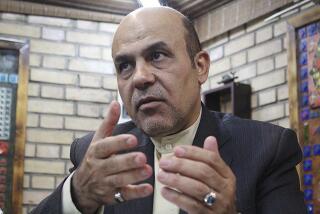Iran denies that returned citizen is nuclear scientist
Reporting from Beirut — The Iranian at the center of a murky intelligence caper — stretching from the deserts of Saudi Arabia to the strip malls of Tucson to the diplomatic outposts of Washington and back to Tehran — is a simple researcher with no special knowledge of his country’s nuclear program, an Iranian official declared Thursday.
Shahram Amiri, who arrived in Tehran on Thursday, had been described by the Iranians as a radio isotope scientist employed by the Atomic Energy Organization and an affiliate of an elite university that trains specialists for the Revolutionary Guard. In a report Thursday, the Washington Post cited unnamed U.S. officials as saying Amiri had been paid $5 million after defecting and cooperating with American intelligence agencies.
But Hassan Qashqavi, a deputy foreign minister who appeared alongside Amiri at a media briefing in Tehran, insisted that Amiri knew nothing about Iran’s nuclear program.
“We deny that Amiri is a nuclear scientist,” Qashqavi said. “Amiri is a researcher at one of Iran’s universities.”
In appearances on the Al Jazeera news channel and Iranian state television, Amiri alleged that he had been kidnapped, psychologically tortured and grilled for information in an attempt to gain intelligence about Iran.
“I can say for sure that I was kidnapped by the CIA with the assistance of Saudi Arabia, and this is definitely what happened,” he told Al Jazeera. “Over 14 months, I was subjected to several kinds of pressure inside America.”
Amiri added that he did not have “any expertise in any nuclear domain or anything else pertinent to the military nuclear domain.”
U.S. officials say Amiri, who is believed to be 32 or 33, came to America of his own volition and left after he became either homesick or worried for his wife and child back in Iran. They have dismissed his claim of being kidnapped as a ruse meant to smooth his way back into the graces of Iranian authorities.
In fact, a U.S. official in Washington briefed on the case said, when Amiri defected last year, while ostensibly on a pilgrimage to Mecca in Saudi Arabia, it was his decision to leave his family behind. Amiri told the CIA that he wasn’t fond of his wife and thought it would be better for his young son to remain behind, said the official, who discussed the case on condition of anonymity.
But in Tehran, sitting at the briefing alongside Qashqavi, Amiri said in comments broadcast on state television that he was drugged and forced to go to the United States on a military plane. Once there, he said, he was pressured to concoct evidence that Iran was pursuing nuclear weapons.
“They wanted me to announce in the American media that I had come to seek asylum in the United States of America of my own free will and that in this process of seeking asylum, I handed over to their country some very important documents and files contained in a laptop, including secret documents about Iran’s nuclear issue,” he said. “By the grace of God, I resisted them.”
U.S. officials insist that Amiri provided “significant information” about Iran’s nuclear program during extensive debriefings with intelligence officials. “You don’t get paid if you don’t,” a U.S. official said.
Amiri was promised about $5 million, officials said, for the information he provided, which was described as “new and important.” Amiri left behind most of the funds when he returned to Iran, one official said.
“Amiri wanted to see his family again and, sadly, he chose a stupid way to do it,” an official said, “lying about what happened to him here to try to build up his credibility back home.”
Iran and the United States are at odds over Tehran’s nuclear program. Tehran insists it is meant only for civilian purposes, but the U.S. and its allies suspect that the regime is seeking to develop nuclear weapons. Even Russia, long a strategic partner of Tehran, has begun to move closer to the American position.
“It is clear that Iran is getting near to possessing a potential which in principle could be used to make a nuclear weapon,” President Dmitry Medvedev told Russian state television Monday.
David S. Cloud in Washington contributed to this report.
More to Read
Sign up for Essential California
The most important California stories and recommendations in your inbox every morning.
You may occasionally receive promotional content from the Los Angeles Times.










